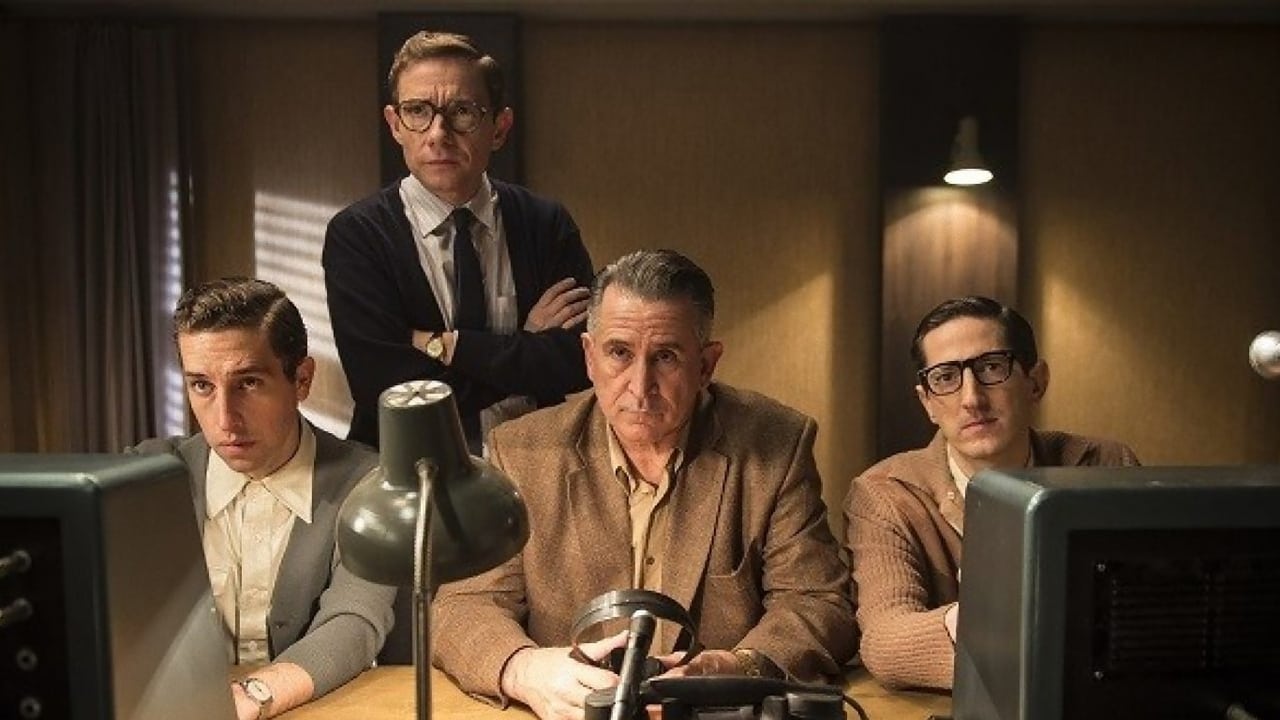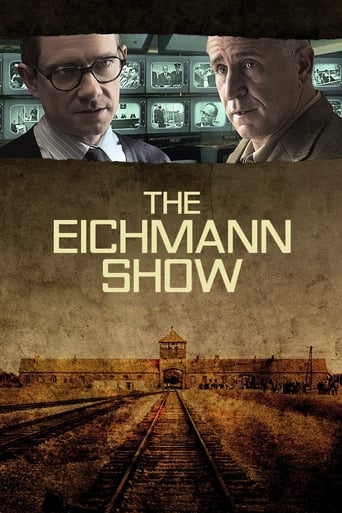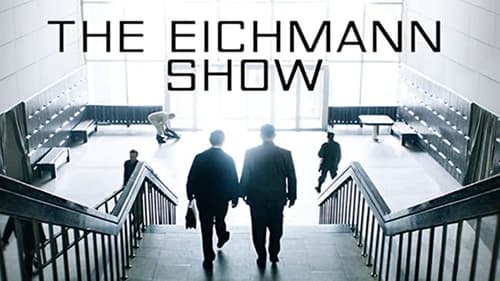


Am I Missing Something?
... View MoreIt isn't all that great, actually. Really cheesy and very predicable of how certain scenes are gonna turn play out. However, I guess that's the charm of it all, because I would consider this one of my guilty pleasures.
... View MoreIt is both painfully honest and laugh-out-loud funny at the same time.
... View MoreThrough painfully honest and emotional moments, the movie becomes irresistibly relatable
... View MoreApart from the flagrantly bad acting of Martin Freeman, whom I have never seen before and hope never to see again, this is an enormously impressive film which tackles a difficult subject well. Excellently done was the blending of the real 1961 trial footage with modern reconstruction, something that frequently goes awry. Here the back-&-forth switching seems odd at first but grows on the viewer, involving us even more closely in the events on screen. Also very clever was the use of English voice-over to all the trial footage, an authentic-sounding simultaneous interpreter, flubs and all, echoing over earphones. Good idea! One did wish, however, that the original languages were occasionally allowed to leak through in voice-over pauses, to give more authenticity to the speakers: atrocity witnesses, prosecutors, judges and also the defendant himself. (In this film it is hard to tell that the trial was conducted almost entirely in German, which is a fact worth knowing; with some witnesses speaking in French, a language utterly unsuited to such descriptions and all the more harrowing for that reason.) Most eyes should be turned away from the camp archive footage, but thankfully there is not too much of it and one is always forewarned. The same cannot be said about watching the defendant himself, which is upsetting. But the Eichmann footage used here was also a choice by the film-makers, to render him less than the "human" Hurwitz starts out by assuming he is.The twisted, vicious face we see continually on display was not, however, the only face available. I had the privilege many years ago of seeing a documentary of the trial, at an art cinema in Tokyo, with English subs. It was very long and composed entirely of trial footage deftly edited: no narration, no music, no inter-titles. (I have tried in vain to locate it on this site; does anyone know the film I mean? I saw it in 97? 98? but it may have been made earlier,in Canada? US? UK?) What I remember about Eichmann was his many faces in the dock. Often a very nervous, ratty man with huge stacks of paper and notepads, which he shuffled through constantly, taking notes and looking for all the world like a perfectly sane accountant on trial for fiddling the books. This aspect was not shown to us in "The Eichmann Show", which is a pity. Not for any kind of sympathy, God knows, but to scare the living daylights out of us by what Arendt called the "banality of evil." In many ways this banal accountant type was more horrible than the leering, sneering, unchanging Satanic face we constantly see in this film... because it did not seem to occur to the accountant that he had done anything seriously wrong. But the film-makers here were wedded to a certain view, and did not want to complicate it.One understands that such an overwhelming event needs simplifying for the movie-going masses, and this film has done a fine job overall. But as I watched it myself, I had the longer documentary in mind to help me come to grips with it. If "help" is the right word.
... View MoreThe movie was completely riveting. As one previous review stated 'you would have to be dead' not to be moved by this subject. I have been watching the Eichmann trail and all I see is a man in a glass booth day after day with no emotion. How is this possible? He looks like a quiet mild mannered man without a mean bone in his body. The movie shows the frustration involved as the cameras constantly move back to Eichmann's face- and there is no reaction. the twitch, the smirk, but really no emotion. The most horrific footage possible of innocent people starved,killed naked, tortured- and yet there is no reaction on Eichmanns faceHow can someone look so normal, be so organized,act so sane and intelligent, and yet be a monster? I had no idea that the camera's were actually holes in the walls so as not to disturb or disrupt the proceedings. The movie tackles some of the deepest issues of the holocaust- it gave a voice to the survivors to finally tell their stories to the whole world. hopefully we won't repeat this ever again. If I were God, I might be tempted to find another Noah, build a new ark, and start all over
... View MoreIn the 1960s the Israeli intelligence service tracked down and captured the former number one Nazi SS officer Adolph Eichmann from his hiding in Argentina. He was responsible for the 'final solution' on the Jewish question, that is the systematic killings of Jews. In Jerusalem the Israeli government is holding a trial for Eichmann and they intend to televise the whole process. They had contracted New York based producer Milton Fruchtman to produce the TV program. Milton then hired Leo Hurwitz, a renowned documentary movie director to direct the show. Their first obstacle to face is the judges are having objections to the presence of cameras in the room, which they deem intimidating. So the production team staged the court room's walls with holes to accommodate the cameras. As the trial begins Leo immediately dances through the camera positions and zooms and pans and getting the additional dramatic effects the program needed. But Milton gets frustrated over the fact that they are losing audience over other world politics issues such as the Cuban missile crisis and Russia's Yuri Gagarin, the first man in space. The audience soon returns as the trial enters the witness testimonies, which stories touched the world deeply. Meanwhile Leo gets more and more obsessed in finding any little hint of humanity left within Eichmann, making him to focus the cameras on Eichmann frequently, to Milton's frustration. Milton barely escapes an assassination attempt and warns the team about their own personal safety. At last comes the moment in the trial where they show Eichmann the footage of the actual things happened in the concentration camps, to which Eichmann didn't flinch. Leo then gives up trying to proof his point about Eichmann as Eichmann is then sentenced to death.The story proves to be quite a hard to judge in overall. As the movie focuses most on the production team, it has distanced itself from the Eichmann character entirely that Adolf Eichmann only existed as the background for this movie. So it's safe to say that the movie is not like what we would find in 1961's Judgment in Nuremberg. In fact in this movie there's no real interaction between Eichmann and the main characters at all. Yet if we see it from the production team's perspective, the movie had done it's obligations in retelling all the things that matter about the trial's video production. But I personally feel that beside that main focus on the trial, the rest of the story felt pretty much flat. This is quite lame because the movie actually brought up a few potential sub stories, such as the ones with Milton and Leo's families, the ones about Yaakov, and the ones about Mrs. Landau.Those being said, I have to say also that the movie reached it's aim in revisiting memories about the Holocaust by the use of the archival footage, not just the footage of the concentration camps, but also the footage of the actual witnesses and of Eichmann himself in the court room in the trial process. The movie's use of reenactments at times on the Eichmann side is to a good purpose. But I think that it's quite unwise to mingle those reenactments with the actual Eichmann archival footage.The acting overall is quite a decent job in my view. Martin Freeman managed to retain his usual character of looking carefree and able to hide even threats to him in order to maintain his team's working spirit. He was also successful in projecting the wider spectrum of Milton Fruchtman's supposedly frustrated condition. Anthony LaPaglia also did well enough in portraying the cool handed and professional director. The extra mission about finding any hint of Eichmann's humanity is also depicted quite nicely by LaPaglia, even to the confrontations with Fruchtman.My say is that The Eichmann Show (2015) deserves a 6 out of 10 score. I would've scored it more if only the rest of the story didn't feel so flat. A recommendation is only for those of you who really like history. Despite being able to be emotional at times, the movie is more informational than it is entertaining.
... View MoreYou need to be dead to be unmoved by this. I had family in several camps, some nearly murdered in Katyn instead feeling "lucky" to be deported to Siberia where 80% did not survive. All around me as a boy there were camp survivors, how could I think they had made up even the least horrifying of the stories they thought I, a child, could stomach and understand? This film about the production crew who had to film the trial and not crack, not loose focus and not drop to the same level as the beast; it is important. It is important because even as they sat there and did their work, one man kept saying that we are all just as capable as Eichmann to cross that line, to be a fascist, to be the beast we do not believe we can be. How in 90 minutes can you convey the horror of the crimes and the effect of 4 months day in day out on those made to be there till the end of the trial? Probably not nearly as well as they would have liked and I suspect it would have been impossible. But come close they did with a series of powerful scenes that exposed the raw nerves, the sense of frustration of the survivors followed by the dignified and stoic release of tension when they knew the world was listening. In their lifetimes they had been allowed to tell their story and see justice of a sort.The closing statement of the piece lifted from the original tapes reminds us of how close so many even today stand at the threshold of repeating these dehumanising acts. The film leaves the viewer in no doubt that the lessons learned in 1961 have been unlearned in many countries since and often with the same grim superiority and justifications. The unnamed nations and future monsters I leave to your imagination as does the film.How often the entire process could have been derailed by well meaning judicial decisions, outside threats, and the unfolding events that at the time did overshadow the trial itself. How these bumps in the road were dealt with are explored with a deft touch that kept us in mindset of the director who at the end of the day needed to keep his mind clear and the staff focused on the job. The production of the trial is the star of the show but never shakes the feeling that it was ever going be like anything before or since. Many of the techniques pioneered at that trial are now taken for granted when broadcasting such events proving yet again that some of the most obvious things today are a result of forced innovation.As for the cast, some better known for comedy and light drama, this was a wonderful chance to show they could do the heavy stuff, often in accents utterly foreign to them. Being a BBC film made to air without adverts and about subject matter that at times was deeply troubling, the script does not waste a second and you never check your watch. I particularly appreciated the use of the many European languages representing the vastness of the crime, then allowing the haunting song during the camp montage to be sung in Polish. Poles, Jews and Catholics alike,suffered massively at the hands of the Nazis and would have been the language most spoken in the court, it seemed only right.One can never say about such a film that you enjoyed it, or that it was thought provoking, that would be strange and wholly inadequate. I would say though that it accomplished what it set out to do really well.
... View More